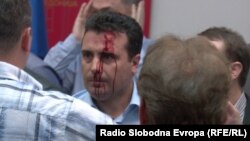Macedonia suspends police officers for parliament invasion
| Publisher | Radio Free Europe/Radio Liberty |
| Publication Date | 20 May 2017 |
| Cite as | Radio Free Europe/Radio Liberty, Macedonia suspends police officers for parliament invasion, 20 May 2017, available at: https://www.refworld.org/docid/59818d8ea.html [accessed 21 May 2023] |
| Disclaimer | This is not a UNHCR publication. UNHCR is not responsible for, nor does it necessarily endorse, its content. Any views expressed are solely those of the author or publisher and do not necessarily reflect those of UNHCR, the United Nations or its Member States. |
May 20, 2017 20:08 GMT
 Protesters, among them masked people, attacked deputies after they stormed parliament in Skopje,including Social Democrat leader Zoran Zaev on April 27.
Protesters, among them masked people, attacked deputies after they stormed parliament in Skopje,including Social Democrat leader Zoran Zaev on April 27.
The Macedonian Interior Ministry has suspended 16 police officers for their failure to prevent a violent storming of the parliament building by nationalist protesters.
The angry invasion of the parliament on April 27, which included masked men, resulted in dozens of journalists and lawmakers being injured, including Social Democratic Union leader Zoran Zaev.
Zaev is now attempting to form a government and become Macedonia's prime minister after he received the mandate from President Gjorge Ivanov, who had previously refused to do so.
The attack on parliament came after the appointment of an ethnic Albanian, Talat Xhaferi, as speaker.
The May 20 announcement named 11 police officers, four special-police-unit members, and a senior ministry official as being suspended because they "passively observed a crowd who entered and moved freely within the parliament . . . and did not help other police officers," the ministry said in a statement.
It added that disciplinary proceedings had also begun against the suspended police.
About 25 percent of Macedonia's 2 million citizens are ethnic Albanians.
The attack on parliament was seen as a blow for the country's aspirations to join both NATO and the EU.
Nationalists were upset by demands made by the ethnic Albanian parties that were negotiating to form a government with the Social Democrats, including making Albanian a second state language.
Based on reporting by AFP and AP
Link to original story on RFE/RL website
